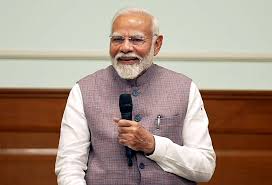India to raise pro-Khalistani activities in UK, extradition of fugitives during PM Modi’s visit

July 23, 2025 | London/New Delhi
Prime Minister Narendra Modi has arrived in the United Kingdom for a high-level diplomatic visit. While trade and strategic cooperation are key goals, national security will dominate many of the closed-door talks. India plans to raise two serious concerns with the UK government: pro-Khalistani extremism and the delay in extraditing financial fugitives.
India’s Growing Concerns Over Khalistani Extremism
India has consistently voiced concerns about Khalistani separatist activities taking place on UK soil. Officials believe that groups based in Britain misuse freedom of expression to promote a dangerous agenda. These groups have organized hostile protests, targeted Indian diplomatic missions, and spread anti-India propaganda online.
During External Affairs Minister S. Jaishankar’s visit to London in March 2025, protesters breached a security barrier and desecrated the Indian flag. That incident, according to Indian officials, crossed all diplomatic boundaries. New Delhi expects stronger UK action to stop such provocations.
A senior diplomat emphasized, “These aren’t isolated events. They reveal a growing threat. Our diplomats and national symbols must be respected.”
India wants the UK to monitor these groups more closely, restrict violent rallies, and investigate their funding sources. New Delhi argues that some individuals abuse asylum laws to shelter in the UK while inciting unrest in India.
Focus on Fugitive Economic Offenders
Apart from national security, India will push for the quick extradition of several high-profile fugitives. These include Nirav Modi, Vijay Mallya, and Lalit Modi. All three are wanted in India for serious financial crimes. Despite legal rulings, they continue to reside in the UK due to delays and legal hurdles.
Nirav Modi, accused of a ₹14,000 crore banking scam, received an extradition order in 2021. However, appeals citing his mental health have stalled the process. Vijay Mallya faces similar delays due to confidential legal proceedings in the UK system. These delays frustrate Indian investigators and damage trust in legal cooperation.
Former diplomat Rakesh Sood commented, “We can’t let economic criminals find safe havens. India has waited long enough.”
New Delhi wants London to fast-track these cases and avoid letting legal loopholes shield fugitives. India believes such delays send the wrong message to offenders and weaken mutual accountability.
UK’s Delicate Balancing Act
The UK faces a tough challenge. It must strengthen ties with India while managing domestic political pressures. Many pro-Khalistani activists live in constituencies with large Sikh populations. Any move against these groups could cause political backlash at home.
However, trade talks with India offer huge economic benefits. The UK, eager to finalize the long-delayed Free Trade Agreement (FTA), may now be more willing to listen. Officials in London have signaled a readiness to share intelligence and cooperate on counter-extremism efforts.
The UK also wants to deepen ties in defense, technology, and the Indo-Pacific region. Shared strategic goals provide a reason to resolve existing disputes.
UK Foreign Secretary David Lammy said, “India is a vital partner. We want to strengthen our relationship through trust, security, and shared values.”
Toward a Strategic Reset
Modi’s visit marks a turning point. India seeks not just symbolic gestures but real action on security and justice. British leaders must decide whether they will support India on issues that affect its core sovereignty.
India is also preparing to sign new agreements on cybersecurity, counterterrorism, and economic cooperation. If successful, the visit could lead to a deeper strategic alignment between the two nations.
In trade, both countries are close to finalizing key areas. These include pharmaceuticals, digital commerce, and skilled labor mobility. The FTA would mark a historic step, offering gains for businesses and professionals on both sides.
Conclusion
Prime Minister Modi’s UK visit is more than a routine diplomatic tour. It carries weight on critical security and justice issues. India is sending a clear message: its global partnerships must be rooted in respect for sovereignty, law, and accountability.
By addressing India’s concerns on extremism and extradition, the UK has a chance to strengthen ties with one of the world’s largest democracies. With shared interests in security, trade, and global stability, both nations now have a rare opportunity to turn goodwill into lasting partnership.






